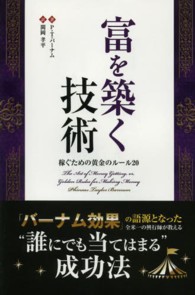Full Description
In Women's Irony: Rewriting Feminist Rhetorical Histories, author Tarez Samra Graban synthesizes three decades of scholarship in rhetoric, linguistics, and philosophy to present irony as a critical model for feminist rhetorical historiography that is not linked to humor, lying, or intention. Using irony as a form of ideological disruption, this innovative approach allows scholars to challenge simplistic narratives of who harmed, and who was harmed throughout rhetorical history.
Three case studies of women's political discourse between 1600 and 1900—examining the work of Anne Askew, Anne Hutchinson, and Helen M. Gougar—demonstrate how reading historical texts ironically complicates the theoretical relationships between women and agency, language and history, and archival location and memory. Interwoven throughout are shorter case studies from twentieth-century performances, revealing irony's consciousness-raising potential for the present and future. Together, these case studies suggest fresh ways to question women's histories and consider how contemporary feminist discourse might be better historicized. Graban urges scholars to re-examine the methods, theories, and practices used in their work as historiographers and rethink how historical knowledge is produced and how archives are used to recover women's political performances.
Ultimately Women's Irony suggests alternative ways to question women's histories and consider how contemporary feminist discourse might be better historicized. Graban challenges critical methods in rhetoric, asking scholars in rhetoric and its related disciplines—composition, communication, and English studies—to rethink how they produce historical knowledge and use archives to recover women's performances in political situations.







